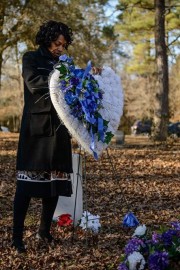Always in Season
Just because we don’t have hundreds of thousands of white people standing around the dead bodies anymore doesn’t mean lynching is dead in America. Jacqueline Olive’s thoughtful and anger-inducing documentary ties our past into our present by showing how lynching and racial terrorism is still a problem in America, and how we will not get past it until we really have a moment of reckoning, as a nation, of the sins that built this nation, and how the reminants of that racial prejudice still resides among us.
Olive began the process of making this film a decade ago, but one of the primary threads in the film involves the death of Lennon Lacy in 2014. (I incorrectly called him otherwise in the below Quick Take video, and I am sorry about that.) He was found hanging on a swing set in a nearby community, and the police quickly ruled it a suicide. But his mother is suspicious, opening up some painful truths about the history of systemic discrimination and how narratives emerge differently when the victim in a black man. Intercut with this is a historical perspective of lynching in the United States- in particular, Danny Glover recounting the lynching of Claude Neal in 1934, and how as little as possible was done to stop it. We also see a group of lynching re-enactors in Georgia whom have put on re-enactions of a Monroe County lynching that led to the death of two couples, one of whom had a child.
Olive’s film is important to absorb. While one cannot possibly show the enormity of America’s history of lynching in a single, 90-minute movie, what she does here does not shy away from the sheer brutality, and the fact that, for large portions of white America, it was a point of pride. Seeing the old pictures and postcards of the crowds at lynchings, unafraid to show their faces, never get easy to see. It’s embarrassing to think that people could be proud of what they did and witnessed. And yet, white America is still in denial about the severity of its disconnect with the African-American community and history. One of the most telling parts of the film is, when looking at the re-enactments of the Monroe County lynching, a white interview subject says, “What can black kids learn from this?” in questioning their worth. How about what white children could learn from this instead? There’s a pattern of thinking among most of the white interview subjects that just cannot really accept that maybe their thinking about the black community is still stuck in the harmful stereotypes they were taught growing up, and finding their way to understanding the suffering their ancestors caused, and trying to think differently.
Lennon Lacy’s case was eventually looked into by the Justice Department, which found that, based on the evidence available, no conclusion could be reached on foul play. But the questions remain, and Lennon’s named is added to those of hundreds of thousands of African-American names who were killed in this country, and had no justice in their deaths. That will not happen until white America can accept how much damage we have inflicted on our African-American brothers and sisters, and help them in changing the way things are so that unsolved lynchings, and the corruption of our justice system, is a thing of the past. Olive’s film is an vital document in making that happen.










